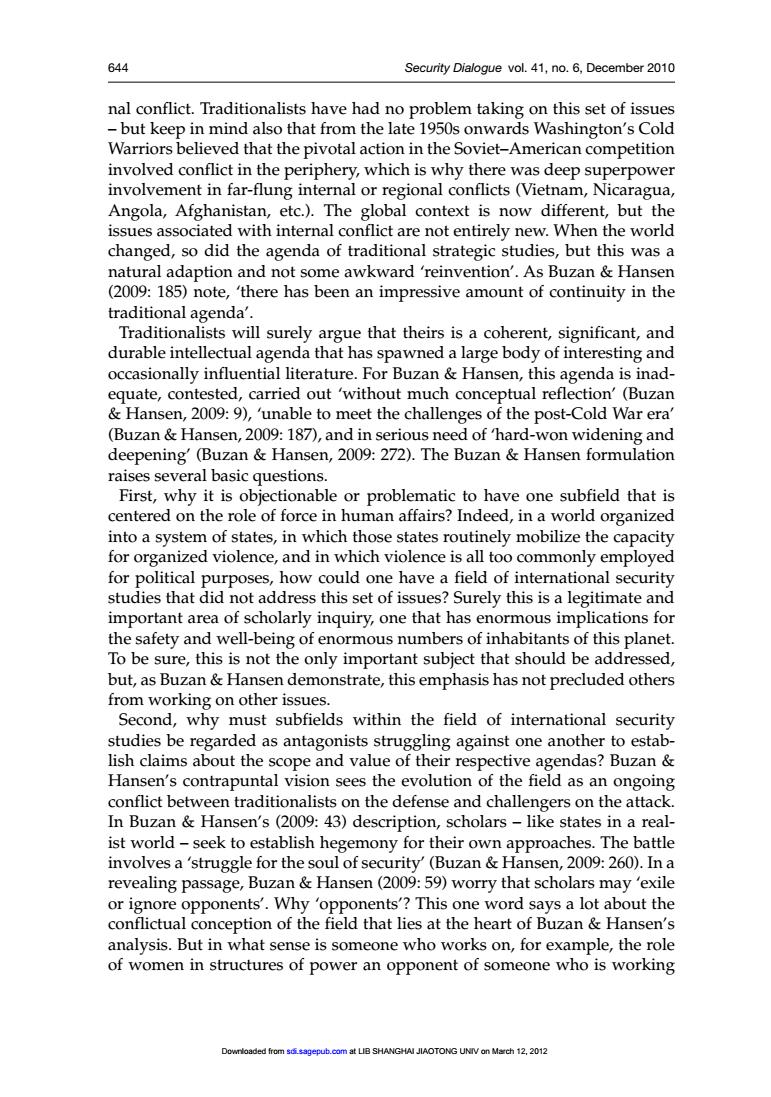正在加载图片...

644 Security Dialogue vol.41,no.6,December 2010 nal conflict.Traditionalists have had no problem taking on this set of issues -but keep in mind also that from the late 1950s onwards Washington's Cold Warriors believed that the pivotal action in the Soviet-American competition involved conflict in the periphery,which is why there was deep superpower involvement in far-flung internal or regional conflicts (Vietnam,Nicaragua, Angola,Afghanistan,etc.).The global context is now different,but the issues associated with internal conflict are not entirely new.When the world changed,so did the agenda of traditional strategic studies,but this was a natural adaption and not some awkward reinvention'.As Buzan Hansen (2009:185)note,'there has been an impressive amount of continuity in the traditional agenda'. Traditionalists will surely argue that theirs is a coherent,significant,and durable intellectual agenda that has spawned a large body of interesting and occasionally influential literature.For Buzan Hansen,this agenda is inad- equate,contested,carried out 'without much conceptual reflection'(Buzan Hansen,2009:9),'unable to meet the challenges of the post-Cold War era' (Buzan Hansen,2009:187),and in serious need of 'hard-won widening and deepening'(Buzan Hansen,2009:272).The Buzan Hansen formulation raises several basic questions. First,why it is objectionable or problematic to have one subfield that is centered on the role of force in human affairs?Indeed,in a world organized into a system of states,in which those states routinely mobilize the capacity for organized violence,and in which violence is all too commonly employed for political purposes,how could one have a field of international security studies that did not address this set of issues?Surely this is a legitimate and important area of scholarly inquiry,one that has enormous implications for the safety and well-being of enormous numbers of inhabitants of this planet. To be sure,this is not the only important subject that should be addressed, but,as Buzan Hansen demonstrate,this emphasis has not precluded others from working on other issues. Second,why must subfields within the field of international security studies be regarded as antagonists struggling against one another to estab- lish claims about the scope and value of their respective agendas?Buzan Hansen's contrapuntal vision sees the evolution of the field as an ongoing conflict between traditionalists on the defense and challengers on the attack. In Buzan Hansen's(2009:43)description,scholars-like states in a real- ist world-seek to establish hegemony for their own approaches.The battle involves a 'struggle for the soul of security'(Buzan Hansen,2009:260).In a revealing passage,Buzan Hansen(2009:59)worry that scholars may 'exile or ignore opponents'.Why 'opponents'?This one word says a lot about the conflictual conception of the field that lies at the heart of Buzan Hansen's analysis.But in what sense is someone who works on,for example,the role of women in structures of power an opponent of someone who is working Downloaded from sdi.sagepub.com at LIB SHANGHAI JIAOTONG UNIV on March 12,2012644 Security Dialogue vol. 41, no. 6, December 2010 nal conflict. Traditionalists have had no problem taking on this set of issues – but keep in mind also that from the late 1950s onwards Washington’s Cold Warriors believed that the pivotal action in the Soviet–American competition involved conflict in the periphery, which is why there was deep superpower involvement in far-flung internal or regional conflicts (Vietnam, Nicaragua, Angola, Afghanistan, etc.). The global context is now different, but the issues associated with internal conflict are not entirely new. When the world changed, so did the agenda of traditional strategic studies, but this was a natural adaption and not some awkward ‘reinvention’. As Buzan & Hansen (2009: 185) note, ‘there has been an impressive amount of continuity in the traditional agenda’. Traditionalists will surely argue that theirs is a coherent, significant, and durable intellectual agenda that has spawned a large body of interesting and occasionally influential literature. For Buzan & Hansen, this agenda is inadequate, contested, carried out ‘without much conceptual reflection’ (Buzan & Hansen, 2009: 9), ‘unable to meet the challenges of the post-Cold War era’ (Buzan & Hansen, 2009: 187), and in serious need of ‘hard-won widening and deepening’ (Buzan & Hansen, 2009: 272). The Buzan & Hansen formulation raises several basic questions. First, why it is objectionable or problematic to have one subfield that is centered on the role of force in human affairs? Indeed, in a world organized into a system of states, in which those states routinely mobilize the capacity for organized violence, and in which violence is all too commonly employed for political purposes, how could one have a field of international security studies that did not address this set of issues? Surely this is a legitimate and important area of scholarly inquiry, one that has enormous implications for the safety and well-being of enormous numbers of inhabitants of this planet. To be sure, this is not the only important subject that should be addressed, but, as Buzan & Hansen demonstrate, this emphasis has not precluded others from working on other issues. Second, why must subfields within the field of international security studies be regarded as antagonists struggling against one another to establish claims about the scope and value of their respective agendas? Buzan & Hansen’s contrapuntal vision sees the evolution of the field as an ongoing conflict between traditionalists on the defense and challengers on the attack. In Buzan & Hansen’s (2009: 43) description, scholars – like states in a realist world – seek to establish hegemony for their own approaches. The battle involves a ‘struggle for the soul of security’ (Buzan & Hansen, 2009: 260). In a revealing passage, Buzan & Hansen (2009: 59) worry that scholars may ‘exile or ignore opponents’. Why ‘opponents’? This one word says a lot about the conflictual conception of the field that lies at the heart of Buzan & Hansen’s analysis. But in what sense is someone who works on, for example, the role of women in structures of power an opponent of someone who is working Downloaded from sdi.sagepub.com at LIB SHANGHAI JIAOTONG UNIV on March 12, 2012